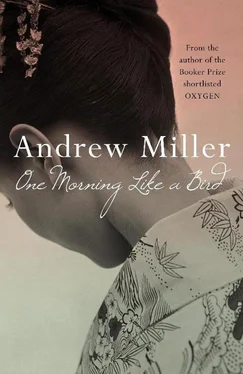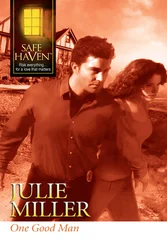‘That was beautiful,’ says Yuji quietly, the words out of his mouth before he has considered them.
‘Chopin,’ she says, turning to him, her blush briefly deepening. ‘ “ Grande Polonaise ”. I’m glad you liked it.’
An earth-tremor at three in the afternoon. Yuji is in the garden, talking through the fence with Kyoko. The old woman and Haruyo are in the street haggling with the boiled-bean-seller. There’s a sudden breeze, the bamboo rustles. Under their fingers, the fence vibrates, under their feet, the earth. They wait, breathlessly, three, four seconds. Then everything resumes, everything is normal again.
In 1923, Kyoko was a small child in her home village in Saitama Prefecture. She thinks Yuji was in Tokyo. He has not chosen to correct her, and Saburo, he assumes, has simply forgotten, as Saburo forgets so much. He grins at her. She grins back. For a while they hold the fence as though, without their gripping it, it would fly into the air and be lost.
On Mother’s birthday, to please her, or rather, to honour her as one honours on certain auspicious dates the family ancestors, Yuji spends the day being as useful as he can. He tidies his room, puts his bedding to air, returns various cups and dishes to the kitchen. He helps Father in the garden weeding and pruning, and after lunch pays Otaki the money he owes. In his room again, he sews a button onto a suit, reads a dozen pages of Isabelle , learns a new French idiom ( entre chien et loup ). Then, a few minutes before five, the little parcel with its wrapping of dark red paper in his hands, he goes downstairs and slides open the doors to Mother’s room. Haruyo is there, hunched beside a brazier on which a small copper kettle is beginning to steam. She dips her head to him. He walks past her, past the folding screen, and kneels opposite Mother. He bows, and wishes her a happy birthday.
There is only a single lamp for the whole room, and not a bright one, so it’s difficult to tell if becoming fifty-one has made much difference to her. He can see no threads of grey in her hair, and the skin of her face — a little blue under the eyes — shows, in this light, barely a wrinkle. Of her body, wrapped in an unpatterned kimono and darker shawl, he has only the sense of something immensely fragile.
She says how nice it is to see him. He thanks her. Round their knees the shadows lie like pools of water. She smiles drowsily as though she has recently woken from a sleep or will shortly need one. Has he, she asks, lost some weight? He says it is unlikely. In the holidays everybody ate a great deal. ‘You know how you get in the winter,’ she says. He says he knows. ‘I pray for you,’ she says. He says he knows. He thanks her. ‘You must listen to Dr Kushida,’ she says. ‘He will advise you. He has been a good friend to the Takano family.’
Behind her head, Ryuichi, school uniform buttoned to the throat, school cap clasped in white-gloved hands, examines Yuji with a gaze he can only endure for a few seconds, such is the weight of judgement in those twelve-year-old eyes. Above the photograph is the slender cross of ivory tipped with iron presented to Grandfather Yakumo when he left the college in Seoul, and on the table below, a stick of incense, a flickering nightlight, an offering of mandarins.
He passes his mother her birthday present, a box of taorizakura cakes from the shop by Ueno Station. She thanks him. She says she hopes he hasn’t spent too much money on her. He assures her he hasn’t.
‘Really?’ she says, unwrapping her gift, ‘but it looks so expensive.’
‘Just something small . .’
‘You’ve been too generous.’
‘Not at all.’
‘Still . .’
Haruyo brings them tea, then retires to the far side of the screen. Though he would admit it to no one, Yuji is frightened of Haruyo, her slab face, the unseemly vivid bulk of her, afraid of her ever since the night — the second after his return from Uncle Kensuke’s — he crept down the stairs from his new room hoping to find comfort in Mother’s bed and found instead Haruyo, motionless by the side of a lantern whose flame splashed her shadow over the walls, big as a net. Nothing was said, but she looked at him then as no adult had looked at him before, certainly no adult he knew, no adult who lived in his home .
‘What is your news?’ asks Mother. ‘Let me hear your news.’
He tells her what seems appropriate, harmless. A few remarks about his friends, about what he’s been reading. He does not, of course, mention the matter of the allowance. Nothing of that nature can even be hinted at. They are silent for a minute. Yuji looks at his tea but does not pick it up.
‘Your father . .’ she says.
‘Yes?’
‘How hard it is for him now.’
Yuji drops his chin in what he hopes will be taken for a gesture of reflection. How long has he been in the room? Fifteen minutes? Half an hour?
‘There’s blossom on the plum tree,’ he says.
‘At the bottom of the garden?’
‘Yes.’
‘That was always the first.’
‘Shall I bring you some?’
‘Thank you,’ she says, ‘though sometimes I prefer just to picture it in my mind. It seems more perfect.’
He tells her — the clever boy lecturing his mother — how the old poets used to cover their windows on the night of the full moon so they could imagine its beauty rather than be distracted by anything so obvious as the thing itself.
She smiles. ‘My son,’ she says, ‘a poet . .’ And for a few seconds it looks as if she might hold out one of her long, white hands to him, as if the spell might break. But then she shivers and looks down. Behind the screen, Haruyo stirs in her fabrics, clears her throat. Yuji rises to his feet, his movements, in this strange room, soft as incense smoke.
That evening after supper he opens the doors of the storage cupboards that stand on the landing between his room and Father’s. The cupboards are so solid, so mysteriously large, he has no idea how they were brought into the house. Lowered through the roof? Carried up the stairs plank by plank and assembled there by a carpenter? For all the years of his life (and for years before that) the cupboards have been the dark and mothballed repositories of whatever was finished with but could not be thrown away. Bamboo fencing swords, school satchels, carp banners, kites, foreign hats long out of fashion. There are even parcels of baby clothes preserved by meticulous hands for some imagined continuation of the Takano line.
He wants to find Ryuichi’s gloves. Each boy had two pairs, white, with three rows of raised stitching on the back and a single mother-of-pearl button at the wrist. One pair of Ryuichi’s was, presumably, reduced to a powder of ashes, but the other . . He looks, does not find them, neither Ryuichi’s nor his own. Instead, behind a box of Shunkei lacquer, on which the remains of a large insect are lying, he discovers a pile of jazz records from the 1920s — Jimmy Harada, Noriko Awaya, King Oliver’s Creole Jazz Band. One by one he slips them from their paper covers, runs the light over the shellac grooves, blows away grains of dust. There was music in this house once. Music and tapping feet, the wail of trumpets, voices, flippant or heartbroken, singing of love, the city, the future . .
He goes to his room, opens the door to the drying platform, steps up into the night air. He drags his bedding from the poles and carries it inside. It’s too early to sleep but too late to do much else. He spreads the bedding on the mats, then, still on hands and knees, recites to himself, like some manner of talking dog, the ghost poem from Electric Dragonfly.
Do ghosts get bored of being ghosts?
Читать дальше












